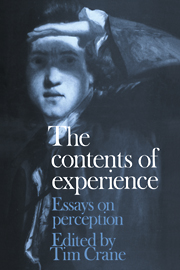Book contents
- Frontmatter
- Contents
- Preface
- Notes on contributors
- 1 Introduction
- 2 The puzzle of experience
- 3 How to interpret ‘direct perception’
- 4 Experience and its objects
- 5 Scenarios, concepts and perception
- 6 The nonconceptual content of experience
- 7 Visual qualia and visual content
- 8 The projective theory of sensory content
- 9 Sight and touch
- 10 The diversity and unity of action and perception
- References
- Index
4 - Experience and its objects
Published online by Cambridge University Press: 22 September 2009
- Frontmatter
- Contents
- Preface
- Notes on contributors
- 1 Introduction
- 2 The puzzle of experience
- 3 How to interpret ‘direct perception’
- 4 Experience and its objects
- 5 Scenarios, concepts and perception
- 6 The nonconceptual content of experience
- 7 Visual qualia and visual content
- 8 The projective theory of sensory content
- 9 Sight and touch
- 10 The diversity and unity of action and perception
- References
- Index
Summary
This paper has three parts. In the first I give an account of the nature of sense perception which lays special emphasis on the role of experience in perceptual processes. In the second I say why a capacity for sense perception as I define it is indispensable for any being that can genuinely engage in belief and judgement about the world. And in the third I criticise modern computational accounts of human perception for treating sensory experiences as effectively epiphenomenal in processes of perceptual cognition.
What is it to perceive something by sense? An answer which I have proposed elsewhere (Lowe 1986b), and which I wish to defend here, goes as follows. (I state it for the special case of vision, but believe that it may be extended in appropriately modified form to the other sense modalities.) One sees an object, I suggest, if and only if one's visual experience is directly causally dependent on certain properties of that object in such a fashion that one is thereby enabled (with the aid of certain background knowledge, maybe) to form a fairly reliable judgement as to what those properties are. These properties will then qualify as visible (to the observer) properties of the object that is seen. As it stands, this proposal is somewhat schematic, and details need to be filled in at various places. This I shall do in due course. But first certain possible queries and objections of a more general nature should be addressed.
- Type
- Chapter
- Information
- The Contents of ExperienceEssays on Perception, pp. 79 - 104Publisher: Cambridge University PressPrint publication year: 1992
- 5
- Cited by



